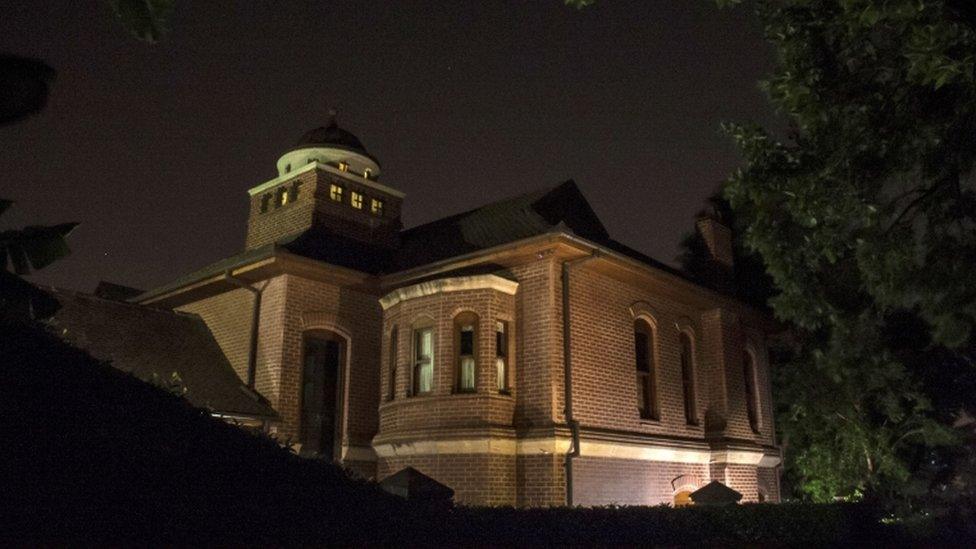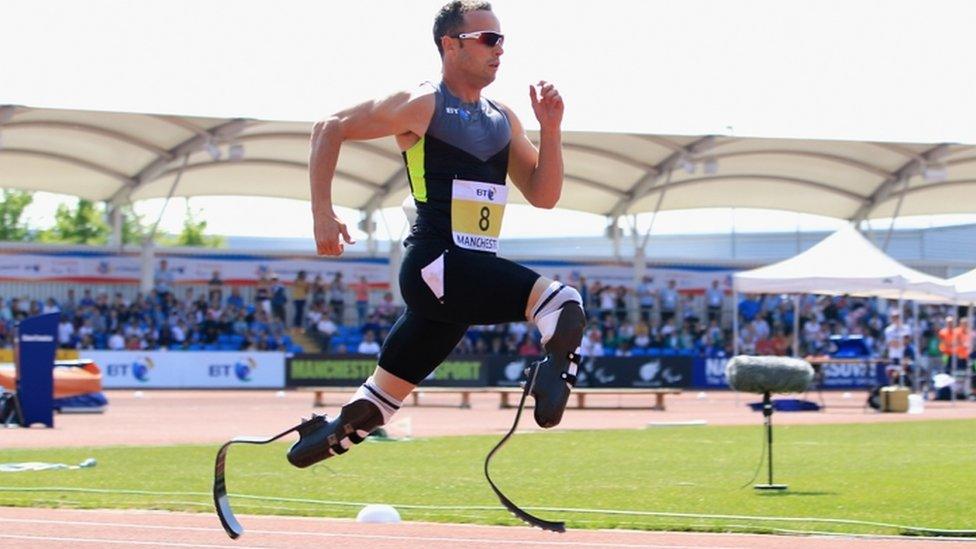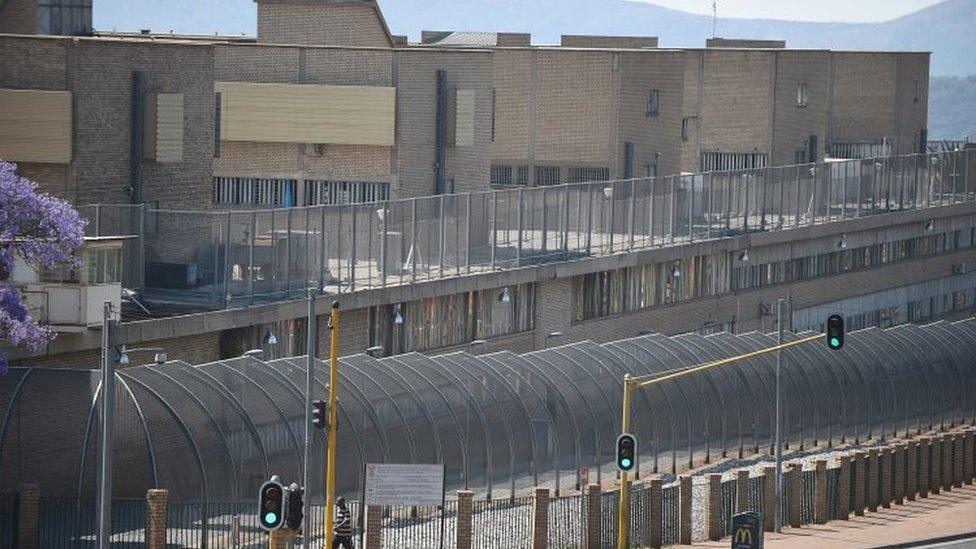Pistorius parole: What will house arrest mean?
- Published

Pistorius will serve the rest of his term at his uncle's home
South Africa's double-amputee athlete Oscar Pistorius is under house arrest in a mansion with high walls and opulent wrought iron gates in the leafy suburb of Waterkloof in the capital, Pretoria.
It is far removed from the city's Kgosi Mampuru II prison, where the athlete has spent the last 12 months.
The Paralympian - who was released from jail a day earlier than expected, presumably to avoid a media scrum - will be under house arrest for the next four years for shooting dead his girlfriend Reeva Steenkamp on Valentine's Day 2013, and for negligently handling a firearm at a restaurant in the same year.
Pistorius was sentenced to five years in prison, but under South Africa's laws an offender can be put under house arrest after serving at least one-sixth of their sentence in jail.
Oscar Pistorius case by numbers
The 28-year-old will be staying at his uncle's home because he had to sell his own house to raise funds for his astronomical legal bills.
The blade-runner, as he was affectionately known - before his fall from grace - because of his prosthetics, will be able do many things while under house arrest.
These include going out to work and doing community service, like cleaning the library - as was suggested during his trial.
His lawyers have argued that track and field training would qualify as work for him, but it is still not entirely clear whether he will be allowed to train.

Pistorius: Track champion

Twenty gold medals to his name
Just 17 when he won gold at the 2004 Paralympic Games
At 2012 Olympics, became first ever amputee to compete alongside able-bodied athletes

But he will not be able to compete in any Paralympic event until 2019, according to spokesman for the International Paralympic Committee.
Craig Spence told the BBC there was a "policy that any athlete who is serving a sentence has to serve that sentence in full".
A close family friend has said that Pistorius is in "poor physical shape", adding that his return to athletics would be unlikely.
Drink and drugs banned
I watched his sister Aimee Pistorius driving out of the property, which makes it clear that his parole conditions allow him to receive visitors.
I also noticed other friends and relatives arriving at the house, some accompanied by young children. He is allowed to attend important family gatherings.
However, he will not be allowed to go out of the house at night - and drinking alcohol and taking drugs are banned.
Prison officials can randomly conduct tests to check whether he is abiding by the order.
Kim Martin, Reeva Steenkamp's cousin: "It's not a fair sentence"
Given the nature of his crime - he fired four shots through a locked door at his home, saying he mistook his girlfriend for a burglar - Pistorius will also not be allowed to have access to any firearms.
During the trial it emerged that he was fascinated by guns and had placed an order for a small arsenal of weapons for his collection.
The prison department already has a parole officer assigned to Pistorius and therefore he will not be electronically tagged.
The parole board has stipulated that the athlete should continue receiving psychotherapy sessions.
A meeting with Ms Steenkamp's parents has also been encouraged - when they are ready and willing.

Reeva Steenkamp was a model and law graduate
In response to his transfer to house arrest, a spokeswoman for the Steenkamp family, Tanya Coen, said: "To them it does not matter whether he was released yesterday, a few hours earlier or a few hours later, whether he remains incarcerated or not. It makes no difference to their lives because Reeva is still not coming back."
Anneliese Burgess, the Pistorius family spokeswoman, told us while we waited outside their home that it was important for them to emphasise "that Oscar's sentence has not been shortened or reduced".
"He is simply entering the next phase of his sentence now. He will serve this under strict conditions that govern correctional supervision."
The Pistorius family is correct: The Paralympian is not totally free and his movements will still be restricted.
The Pistorius family spokesperson emphasised that his sentence has not been "shortened or reduced"
Vanessa Padayachee, an official with the non-governmental organisation Nicro, which works with offenders to help them reintegrate into society, says South Africa's parole system is very progressive.
It helps the government to save on funding the incarceration of offenders.
"It's used in many parts of the world including in the United States of America," she told me.
If Pistorius violates any of the parole conditions, he faces various punitive measures - the most stringent of which would be a return to prison.
"We do not send people to prison to punish them. We want to rehabilitate them so that they must not be able to do what they've done," says Ms Padayachee.
"And it's the human connection you get when you are under house arrest that transforms people."

Pistorius was at the Kgosi Mampuru II prison in Pretoria
Ensuring that prisoners do not repeat the same crime again is what is important for the prison authorities.
Prison is not necessarily the best environment to do this and some may come out worse than when first locked up, Ms Padyachee explains.
But as Pistorius settles into his new routine, his legal battles are far from over.
Prosecutors want his conviction to be changed from culpable homicide, or manslaughter, to murder - or at the least to have his five-year prison sentence extended to 15 years.
The case will be heard by the Supreme Court of Appeal next month - and if the verdict goes against the athlete, he could find himself back in prison.